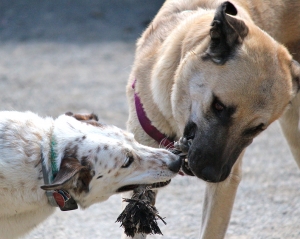Dogs
Temp– 100.5-102.5
Pulse– 70-100
Respiratory Rate– 18-34
Top 10 reasons pet owners seek veterinary care for DOGS:
- Skin Allergies
- Ear infections
- Non-cancer skin masses
- Skin infection
- Arthritis
- Vomiting/Upset GI tract
- GI inflammation/diarrhea
- Periodontal disease/Dental disease
- Bladder/Urinary tract problem
- Soft tissue trauma

Runners-up: Hypothyroidism, Eye inflammation.
Note: This list varies slightly year-year.
Helpful Information and Links:
VeterinaryPartner.com – Physical Exam Checklist for Pets
Pet MD: Hyperthermia and Heatstroke in Dogs
Vet Street: Bee Stings in Dogs
Keeping Livestock Herding Dogs Safe:
The obvious comment here is to maintain control of your dog and the situation. Do not expose an untrained dog to unknown or fractious livestock. Dogs are commonly kicked (often in the head), stomped, or run over by livestock. The best way to avoid this is through training (both you and the dog), and by knowing and understanding the animals/equipment/terrain you are working with.
Other risks to livestock herding dogs include infectious diseases passed from the livestock to the dog. One of these diseases is Leptospirosis, or Lepto. Leptospirosis is an infectious disease caused by a spirochete organism that typically affects the kidneys of a non-adapted host animal. This is a zoonotic disease, meaning that animals (including dogs) can pass the disease to people. The organism is shed in the urine of infected livestock or wildlife, and is picked up via the skin, mucous membranes, or ingestion by dogs. Common carriers of lepto include livestock and wildlife (cows, pigs, coyotes, wolves). Working dogs become infected through contact with the organism in ponds, creeks, irrigation water, orchard irrigation (any water accessed by livestock or wildlife). Vaccinating against Lepto can reduce your dog’s risk of contracting the disease. The vaccine can be given as part of the routine distemper/hepatitis/parvo vaccine (DHLPP), or it can be given individually. Unvaccinated dogs will require a minimum of 2 vaccines, given 3-4 weeks apart, then annual boosters. A typical Lepto vaccine will include 2-4 servovars (species-specific strains of Lepto). However, there are approximately 200 naturally occurring serovars, so vaccination alone cannot fully prevent infection. For further information, check these links:
Lepto Info: Your Lepto Resource
Veterinary Partner: The Pet Health Library
Parasite Considerations in Livestock Herding Dogs:
CAPC – Neosporosis: Canine Neosporosis
